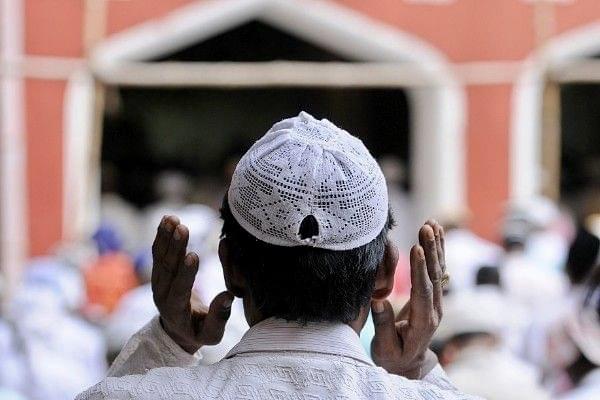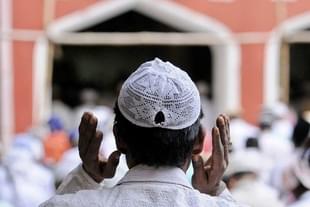Politics
Learning From History: Why Calling For Muslims To Vote En Bloc Is Dangerous
Deepanjali Bhas
Apr 25, 2019, 12:12 PM | Updated 12:12 PM IST
Save & read from anywhere!
Bookmark stories for easy access on any device or the Swarajya app.


As Congress Party leader Navjot Singh Sidhu on Tuesday publicly urged Muslims in Katihar, Bihar, to vote en bloc and defeat Modi as they are 64 per cent of the population and not a minority but a majority, it shocked many of us. It is also an eerie reminder of why such statements cannot be brushed aside but are, on the other hand, dangerous to the very identity of India. They mimic an exhortation from India’s tragic past when the nation was divided on the demand for a separate land for Muslims.
In the poll frenzy of April 2019, Bahujan Samaj Party chief Mayawati paved the way for Sidhu last week in her brazen call to Muslims to vote as a mass with no individual discretion – that which is at the core of parliamentary democracy. It’s a false equivalence to compare Mayawati’s call to Muslims to oust a national party like the Bharatiya Janata Party (with no real valid reason) and statements in response by Uttar Pradesh Chief Minister and BJP leader Yogi Adityanath. Both leaders faced Election Commission (EC) censure and the UP CM received a harsher penalty than Mayawati.
Even if so-called liberals including mainstream media present these two instances as one and the same, they are not the same and here’s why.
A Reminder Of Why Partition Happened
That it was the Muslims who called for a separate nation because they could not bear to live under Hindu “subjugation” after the British left India, is not quite well taught in our school history. But it needs to be clearly stated that the demand for Pakistan was purely from Muslim leaders like Sir Syed Ahmed Khan (an Aligarh Muslim University founder); as early as 1888, he said Hindus and Muslims could not live as one nation. Much later, a barely practising Muslim, Mohammed Ali Jinnah quit Indian National Congress (INC) in 1913 and joined All India Muslim League becoming its President in 1934. There was no ambiguity in the League’s demand - it was not pro-united India and, in fact, was vehemently anti-Hindu. The 1920s and ‘30s witnessed violent riots, mass murders and rapes of Hindu women by Muslims, encouraged by the League. Religious polarisation in India was born with these separatist movements in the decades before 1947.
Jinnah knew he must show the British and an uncertain Congress that Muslims would respond with violence if their demand was not met – hence Direct Action Day, 16 August 1946; over 6,000 Hindus were massacred in Calcutta, the worst riots of British India.
The Congress Working Committee formally accepted Partition of India on 3 June 1947; Gandhi ji tacitly agreed by practising maun vrat that very day. Today, India faces the persistent threat from Pakistan that sees India as a Hindu kafir nation though India has the world’s second-largest Muslim population after Indonesia.
Muslims had voted-near unanimously for Muslim League and its demand for Pakistan in separate electorates under the British in Bihar, United Provinces (Uttar Pradesh), Bengal and Bombay Presidency (Mumbai). In the 1945 general elections held for the Constituent Assembly, the Muslim League won an overwhelming majority in the Muslim reserved seats - 425 of out of 496, accounting for 89.2 per cent of Muslim votes.
In the January 1946 Provincial elections held to elect members of the Legislative Councils of the provinces, the League won a majority of Muslim votes securing 4.5 million of about 6 million votes. A theory is often presented that only 13 per cent of the community was eligible to vote in British India and hence it can’t be said that all Muslims wanted partition. But that’s a lame argument as undeniably Jinnah rose as a mass Muslim leader only on the demand for Pakistan; Muslim masses thronged to his rallies, reaffirming his call. The Muslim electorate thus, was representative of the masses’ desires.
These are facts and the narrative then is the eerily the same as we see today, almost on a daily basis. While then it was only Muslim leaders with the divisive speak, now it is any so-called leader with no regard for India.
In the run-up to Partition, senior INC leaders debated on a transfer of populations between the regions; Dr BR Ambedkar, who drafted India’s Constitution, argued strongly in favour of relocating all Muslims from India to Pakistan and moving Hindus and Sikhs from West Punjab, NWFP, Sindh and East Bengal to India. He contended that Muslims had voted near-unanimously for partition but Nehru pushed for allowing Muslims who wished to remain in India to do so even allowing them voting rights which Dr Ambedkar had been against. It is bizarre that no other large nation had ever seen such an allowance made for violent separatists.
It is thus important to emphasise why any leader calling upon Muslims to defeat BJP (and mind you, its only the BJP) without articulating facts and instead spreading falsehoods about increased “intolerance” against Muslims in the last five years, points to a dangerous trend – dangerous to India’s unity and to its citizens feeling a sense of belonging with the nation at the core.
Thinking Muslims Must Call Out Divisive Leaders
Partition extracted a colossal price from India and we in free India should never forget that over 10 million people were impacted by Partition with the brutal deaths of 6 million, mostly Hindus and Sikhs.
For decades after Independence, there were no demands for Muslim block votes. The “victim complex” among Muslim leaders is a trend growing strong since the start of the 21st century. Interestingly, (the writer is not a member of any party but is part of a sensitised Indian citizenry), BJP does not even have a religious word in its name but parties with explicit religious names like Majlislis-e-Ittehadul Muslimeen (of Owaisi fame) and the infamous Muslim League active in Kerala, incite a needless Muslim persecution complex against parties that have actually delivered on the ground.
Most leaders who exhort Muslims to vote as a block and promise heaven on earth, fail to deliver. If BJP put vikas at the centre of its 2014 campaign and didn’t discriminate in service delivery to people on religious lines, then is there any basis for divisive leaders in promoting such a claim?
Identity politics at the cost of development can be a death blow to any community. It is up to the thinking Muslims in India, therefore, to determine their position as being with India as she progresses. They must realise the dangers in fake narratives of “intolerance” in a country that grants Muslims the right to live as free citizens. Fear mongers must be countered with facts that are in the public domain.
For instance, why is it that under the NDA, if communal violence increased 28 per cent over the three years to 2017 (822 “incidents” recorded that year) but aha, it was well short of the 10-year high in communal incidents at 943 in 2008? (reference: an IndiaSpend analysis of Home Ministry data). Again, why did the BJP, in Gujarat 2017 state elections, bag the majority of seats with Muslim population between 10-15 per cent and seven out of 11 seats with Muslims in the range of 15-20 per cent, where Muslims voted on economic lines? (as reported in The Economic Times, 21 December 2017).
The silence of the thinking Muslims in India to continuous divisive statements would mean a very dangerous incitement of separatist Islamist tendencies nationwide. Let none among Muslims shout against others as being the root of their problems, but instead introspect and nip this communal narrative in the bud. Let them not pretend that the discourse promoted by the Sidhus, Mayawatis and Owaisis, are only words. For India’s history bears witness.
Deepanjali Bhas is a former business correspondent with The Times of India, with professional experience in non-profit organizations and the corporate sector.





